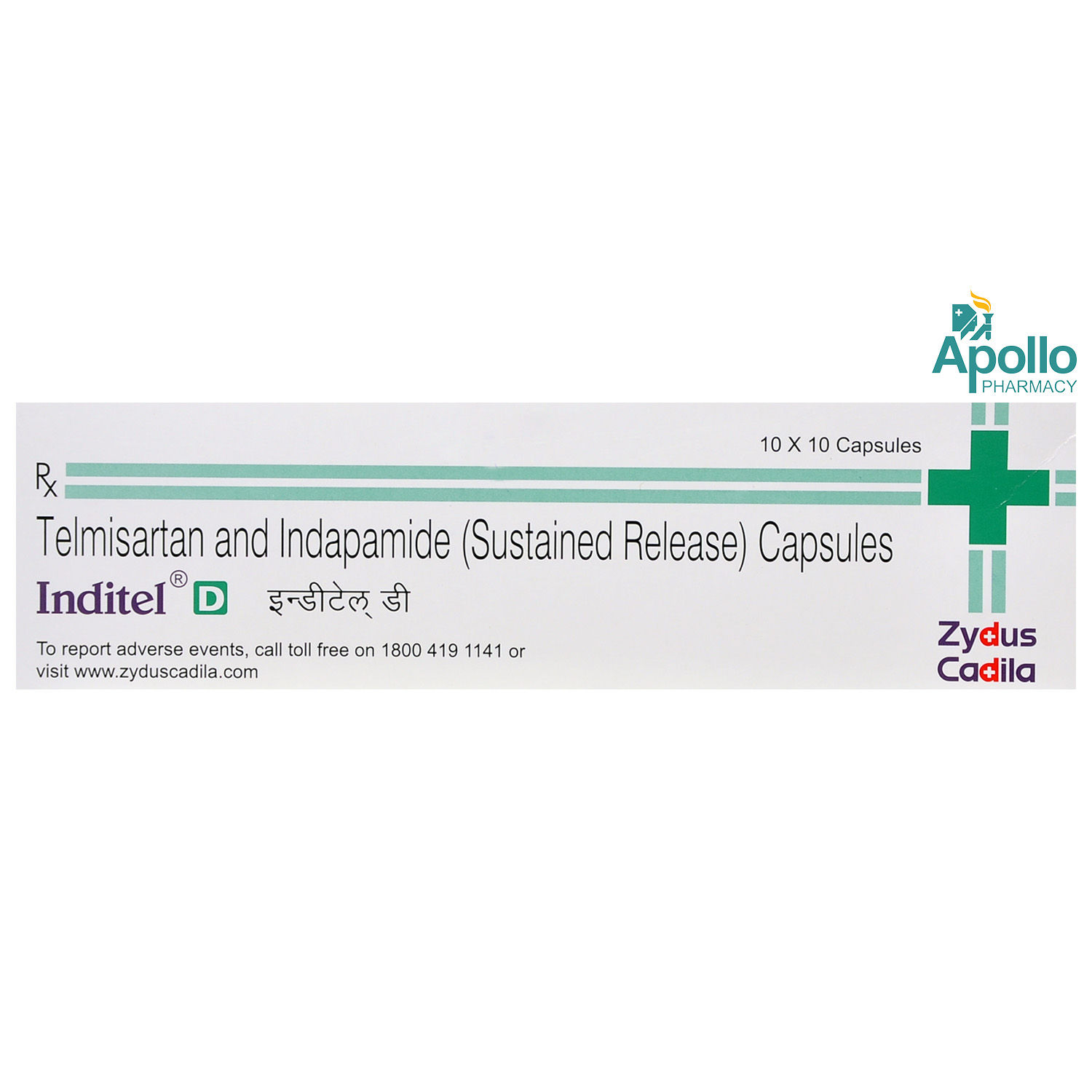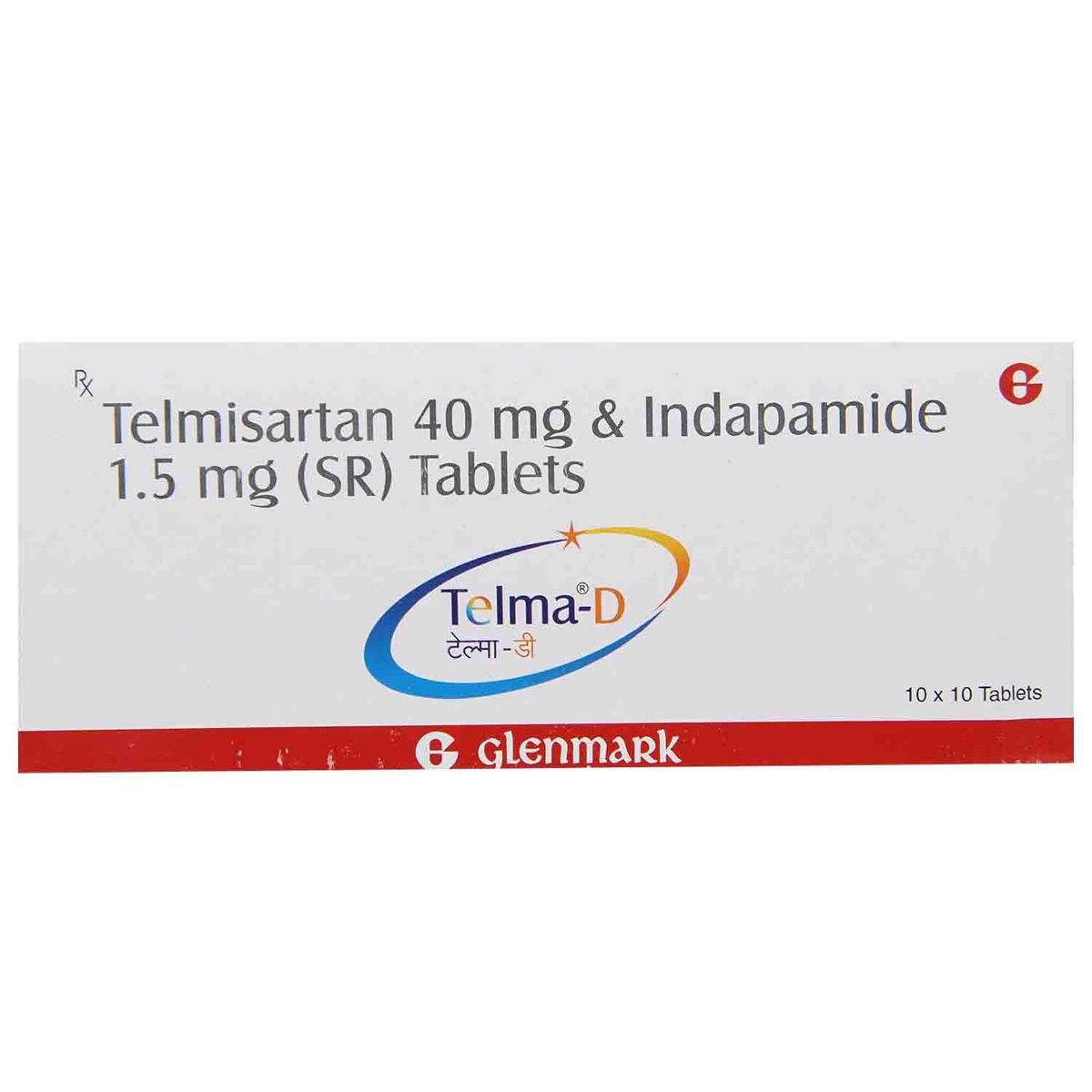Telmisartan+indapamide
About Telmisartan+indapamide
Telmisartan+indapamide is used to treat hypertension (high blood pressure). Hypertension or high blood pressure is a life-long or chronic condition in which the blood pressure against the artery wall becomes too high. It can lead to the risk of heart diseases, like heart attack and stroke.
Telmisartan+indapamide is a combination of Telmisartan (angiotensin II receptor antagonist) and Indapamide (diuretic or water pill). Telmisartan is an angiotensin receptor blocker that helps to relax and widen the blood vessels (arteries). Indapamide is a diuretic that removes extra water and several electrolytes from the body. It also relaxes blood vessels and enhances blood flow. Together, it lowers blood pressure and prevents the risk of stroke, heart attack and oedema (fluid retention).
Take Telmisartan+indapamide as prescribed by your doctor. You are advised to take Telmisartan+indapamide as long as your doctor has prescribed it for you, depending on your medical conditions. You may experience nausea, diarrhoea, stomach pain, constipation, infection, headache, dizziness, back pain, inflammation of the nose, chest pain, weakness, indigestion, hypertonia (increased muscle tone), nervousness, peripheral oedema, sore throat, cough, conjunctivitis (inflammation in the eyeball), sinus inflammation. Most of these side effects of Telmisartan+indapamide do not require medical attention and gradually resolve over time. However, if the side effects are persistent, reach out to your doctor.
Do not use potassium supplements or salt substitutes unless the doctor has told you. In rare cases, Telmisartan+indapamide can cause a condition that results in a skeletal muscle problem, leading to further kidney failure. If you notice unexplained muscle pain, dark colour urine, tenderness or weakness, especially if you also have a fever or unexplained tiredness, immediately contact the doctor. If you have diabetes, do not use Telmisartan+indapamide with any medication that contains aliskiren (a blood pressure medicine). Before taking Telmisartan+indapamide, tell your doctor if you have ever had liver disease, kidney failure, glaucoma, high or low levels of magnesium or potassium in your blood, have allergies or asthma, lupus (an autoimmune disease), diabetes or an allergy to penicillin or sulfa drugs.
Uses of Telmisartan+indapamide
Medicinal Benefits
Telmisartan+indapamide belongs to the class of anti-hypertensives primarily taken to treat hypertension (high blood pressure). Telmisartan+indapamide is a combination of Telmisartan (angiotensin II receptor antagonist) and Indapamide (diuretic or water pill). Telmisartan is an angiotensin receptor blocker that helps to relax and widen the blood vessels (arteries). Indapamide is a diuretic that removes extra water and several electrolytes from the body. It also relaxes blood vessels and enhances blood flow. Together, it lowers blood pressure and prevents the risk of stroke, heart attack and oedema (fluid retention).
Directions for Use
Storage
Side Effects of Telmisartan+indapamide
Nausea
Diarrhoea
Stomach pain
Constipation
Infection
Headache
Dizziness
Back pain
Inflammation of the nose
Chest pain
Weakness
Indigestion
Nervousness
Peripheral oedema
Sore throat
Cough
Drug Warnings
Telmisartan+indapamide should not be given to the people allergic to Telmisartan+indapamide or any of its ingredients, have low blood pressure (less than 90 mm of Hg), have had a heart attack, kidney disease, liver disease, pregnant women, or planning to get pregnant and breastfeeding women. It should be used with caution in patients who have diabetes. Besides this, it is contraindicated in low blood pressure (hypotension), cardiogenic shock (sudden stopping of blood flow to the heart) and aortic stenosis (heart valve problem). Telmisartan+indapamide can pass into breast milk, so before starting Telmisartan+indapamide, either you need to stop nursing or you should not take Telmisartan+indapamide while breastfeeding. If you have anuria (non-passage of urine), please do not take Telmisartan+indapamide as it is contra-indicated in it and may lead to further complications.
Drug Interactions
Drug-Drug Interactions: Telmisartan+indapamide may have an interaction with other anti-hypertensive medications (aliskiren), medications used for heart disease (amiodarone), antidiabetic medications (acarbose), antiallergic medications (Phenylephrine), medications used for cough (dextromethorphan), medications for chest congestion (guaifenesin), and painkiller medications (paracetamol).
Drug-Food Interactions: Telmisartan+indapamide may interact with high potassium-containing food and drinks. Also, alcohol should not be consumed while taking Telmisartan+indapamide.
Drug-Disease Interactions: Telmisartan+indapamide can interact with certain diseases. Hence, it is advisable to tell the doctor about the past or current medical history, including angioedema, diabetes, hyperkalemia, low blood pressure, potassium deficiency, liver and kidney disease.
Drug-Drug Interactions Checker List:
Safety Advice

Alcohol
cautionYou are recommended not to consume alcohol and Telmisartan+indapamide to avoid unpleasant side effects like drowsiness, dizziness, and liver damage.

Pregnancy
cautionTelmisartan+indapamide may cause fetal damage and can affect the unborn baby (fetus). Please consult your doctor before taking Telmisartan+indapamide if you are pregnant or planning to conceive

Breast Feeding
cautionTelmisartan+indapamide is known to pass breast milk, but, its effect on the baby is not known. So, before breastfeeding, let your doctor know about this.

Driving
cautionDrive with caution, Telmisartan+indapamide usually causes dizziness and affects driving ability.

Liver
cautionPlease take Telmisartan+indapamide only with the doctor's advice if you have a history of liver diseases/conditions

Kidney
cautionLet your doctor know if you have any history of kidney diseases or impairment before taking Telmisartan+indapamide.

Children
cautionTelmisartan+indapamide is not recommended in children younger than 18 years of age.
Habit Forming
Diet & Lifestyle Advise
Keep your weight under control with BMI 19.5-24.9.
Do regular physical activity or exercise for at least 150 minutes per week, or about 30 minutes most days of the week. Doing this can help you to lower your raised blood pressure by about 5 mm of Hg.
Limit intake of sodium chloride (table salt) in your daily diet to 2300 mg per day or less than 1500 mg is ideal for most adults.
If you are taking alcohol, then only one serving for women and two servings for men is advisable.
Quitting smoking is the best strategy to lower the risk of heart disease.
Avoid chronic stress as it can raise your blood pressure. Try to enjoy and spent time with your loved ones to cope with stress and practice mindfulness techniques.
Monitor your blood pressure daily and if there is too much fluctuation, then immediately contact your doctor.
Try to include heart-healthy omega 3 fatty acids containing food drinks in your daily diet. You can also use low-fat cooking oil like olive oil, soybean oil, canola oil, and coconut oil to lower your elevated blood pressure.
Special Advise
Regularly monitor blood pressure levels to prevent hypotension (low blood pressure).
Get up slowly while rising from lying or sitting position as Telmisartan+indapamide may cause dizziness.
Your doctor may advice regular monitoring of electrolyte, as Telmisartan+indapamide may cause fluctuations in electrolytes.
Patients Concern
Disease/Condition Glossary
Hypertension: It is a chronic condition when blood pressure is too high. This condition can lead to hardened arteries (blood vessels), decreasing the blood and oxygen flow to the heart. Blood pressure is the measurement of the force that our heart uses to pump blood to all parts of the body. Raised blood pressure can cause chest pain (angina) and heart attack (when the blood supply to the heart is blocked). Additionally, high blood pressure also causes brain damage (stroke) and kidney failure. High blood pressure can be diagnosed with the help of a blood pressure monitor or sphygmomanometer. Systolic pressure is the pressure when the heart pumps blood out. On the other hand, diastolic pressure is when your heart is at the resting stage between heartbeats. If your blood pressure is 140/90 mm of Hg, it means the systolic pressure is 140 mm of Hg, and diastolic pressure is 90 mm of Hg. Ideal blood pressure should be between 90/60 mm of Hg and 120/80 mm of Hg.
FAQs
Telmisartan+indapamide belongs to the class of anti-hypertensives used to treat hypertension (high blood pressure).
No, you are advised to inform your doctor and monitor your blood pressure for at least two weeks before stopping the Telmisartan+indapamide. Depending upon your current blood pressure readings, there is a possibility your doctor may lower your medicine dosage and not recommend to discontinue it.
Telmisartan+indapamide can be safely taken as long as your doctor has prescribed it to you. Conditions such as high blood pressure are life-long conditions and one should not abruptly discontinue it without discussing it with a doctor.
The use of Telmisartan+indapamide is considered harmful to people with known allergy to any of the components of Telmisartan+indapamide. It should preferably be avoided in people with severe kidney or liver damage and people with anuria (reduction or absence of urine). It should also be avoided in women who are in the second and third trimesters of their pregnancy.
Telmisartan+indapamide is usually safe to take for a long time. Some blood pressure medicines work best when they are taken for a long time. If not sure, inform your doctor.
In case, you have missed a dose of Telmisartan+indapamide, you are advised to take it as soon as you remember. However, try not to miss a dose in the first place, if it's time for you to take your next dose, then do not take both the doses together. Take only one dose, taking a double dose of Telmisartan+indapamide will lead to low blood pressure.
Yes, prolonged intake of Telmisartan+indapamide can cause an increase in blood potassium level. So, patients taking Telmisartan+indapamide should avoid taking supplements and food rich in potassium to avoid any unpleasant side-effect.
Yes, the use of Telmisartan+indapamide can cause dizziness in some people, as it is one of the side effect of Telmisartan+indapamide. So if you feel dizzy or lightheaded, take some rest and resume after you feel better.
Telmisartan+indapamide should be stored in a cool, dry place away from sunlight, at room temperature. Make sure to keep it out of reach of children and pets.
If you stop taking Telmisartan+indapamide, your blood pressure may rise, which can increase your risk of heart attack or stroke. Therefore, it is important to continue taking the Telmisartan+indapamide for the prescribed duration and do not stop suddenly. If you experience any persistent side effects, consult your doctor.
If Telmisartan+indapamide doesn't seem to make you feel any better, it is important to consult your doctor. They may change your dosage, it’s crucial not to stop taking the medication without your doctor’s advice, as this could lead to a rise in blood pressure and increased risk of heart attack or stroke.
There is no clear confirmation that Telmisartan+indapamide affects fertility in either men or women. However, some blood pressure medications can impact sexual function. If you notice any changes or have any concerns regarding this, consult your doctor.
While taking Telmisartan+indapamide, it's important to make some lifestyle changes to help manage your blood pressure effectively like reducing salt intake, managing stress, maintaining a healthy diet, exercising regularly, limiting alcohol, quitting smoking, and getting enough sleep.
Telmisartan+indapamide can cause side effects like nausea, stomach pain, diarrhoea, constipation, headache, infection, back pain, dizziness, nose inflammation, weakness, chest pain, indigestion, peripheral edema, nervousness, cough, sore throat, sinus inflammation, and conjunctivitis. If any of these persist or worsen please consult your doctor.




